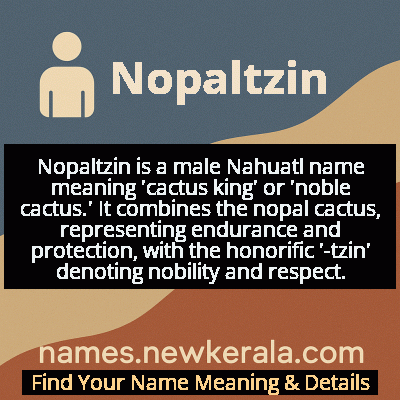Nopaltzin Name Meaning & Details
Origin, Popularity, Numerology Analysis & Name Meaning of Nopaltzin
Discover the origin, meaning, and cultural significance of the name NOPALTZIN. Delve into its historical roots and explore the lasting impact it has had on communities and traditions.
Name
Nopaltzin
Gender
Male
Origin
Nahuatl
Lucky Number
1
Meaning of the Name - Nopaltzin
Nopaltzin is a male Nahuatl name meaning 'cactus king' or 'noble cactus.' It combines the nopal cactus, representing endurance and protection, with the honorific '-tzin' denoting nobility and respect.
Nopaltzin - Complete Numerology Analysis
Your Numerology Number
Based on Pythagorean Numerology System
Ruling Planet
Sun
Positive Nature
Leaders, ambitious, highly driven, self-reliant, innovative.
Negative Traits
Overly aggressive, domineering, impatient, selfish.
Lucky Colours
Red, orange, gold.
Lucky Days
Sunday.
Lucky Stones
Ruby, garnet.
Harmony Numbers
2, 3, 9.
Best Suited Professions
Entrepreneurs, managers, engineers.
What People Like About You
Courage, determination, leadership.
Famous People Named Nopaltzin
Nopaltzin
Toltec-Chichimec ruler
Legendary founder of the Texcoco kingdom and important figure in the Chichimec migration into the Valley of Mexico
Nopaltzin (modern)
Indigenous rights activist
Prominent advocate for Nahua cultural preservation and language revitalization in central Mexico
Nopaltzin Xochitl
Traditional healer
Renowned practitioner of traditional Nahua medicine and herbal knowledge preservation
Name Variations & International Equivalents
Click on blue names to explore their detailed meanings. Gray names with will be available soon.
Cultural & Historical Significance
Historically, the most famous bearer was Nopaltzin, the Chichimec leader who played a crucial role in the settlement of the Valley of Mexico and the establishment of the Acolhua domain around Texcoco. According to colonial-era chronicles, this historical Nopaltzin was instrumental in the transition from nomadic Chichimec life to settled agricultural society, symbolizing the integration of different cultural traditions that characterized central Mexican civilization. The name thus represents not just individual nobility but the civilizing process itself—the transformation of wilderness into cultivated society while maintaining connection to the natural world that sustained it.
Extended Personality Analysis
Individuals named Nopaltzin are often perceived as possessing a unique blend of resilience and nobility. Like the cactus that forms the root of their name, they demonstrate remarkable endurance in challenging circumstances, able to thrive where others might struggle. They typically exhibit a protective nature toward their community and traditions, serving as guardians of cultural knowledge and family heritage. The noble connotation of '-tzin' suggests they carry themselves with dignity and command respect naturally, often taking on leadership roles where wisdom and stability are valued.
Their personality combines the practical wisdom of the earth with the elevated perspective of leadership, making them both grounded and visionary. They tend to be deeply connected to their roots while simultaneously forward-thinking, embodying the balance between tradition and progress that has characterized indigenous resilience through centuries of change. People with this name often display a quiet strength rather than overt aggression, much like the nopal that withstands harsh conditions through adaptation rather than confrontation. They are typically patient, observant, and strategic in their approach to challenges, drawing on deep reserves of inner strength and cultural memory to navigate complex situations.
Modern Usage & Popularity
In contemporary times, Nopaltzin remains a relatively rare but culturally significant name, primarily used within Nahua communities and among families seeking to honor their indigenous heritage. The name has seen a modest resurgence as part of the broader indigenous cultural revival movement in Mexico and among diaspora communities. While not appearing on mainstream popularity charts, it holds special importance for families wanting to maintain linguistic and cultural connections to their ancestral roots. Modern usage often reflects a conscious choice to preserve Nahuatl naming traditions and resist cultural assimilation, making it more common in regions with strong indigenous presence like Puebla, Tlaxcala, and parts of Mexico State. The name is occasionally adopted by non-indigenous parents interested in unique, meaningful names with deep cultural history, though this remains uncommon due to the name's specific cultural context and significance.
Symbolic & Spiritual Meanings
Symbolically, Nopaltzin represents the union of earthly resilience and noble spirit. The nopal cactus symbolizes endurance, protection, and life-sustaining qualities—able to store water in arid conditions, produce nutritious fruit, and serve as natural fencing. Its thorns represent boundaries and defense, while its paddles signify nourishment and healing. The '-tzin' honorific elevates these qualities to a noble plane, suggesting that these survival traits are not merely practical but sacred and worthy of respect. Together, the name embodies the ideal of leadership rooted in practical wisdom, protection of community, and the ability to sustain life and culture through challenging circumstances. It speaks to the indigenous worldview that sees nobility not in wealth or power alone, but in the capacity to nurture and protect one's people and traditions, drawing strength from the land while providing guidance and stability to the community.

